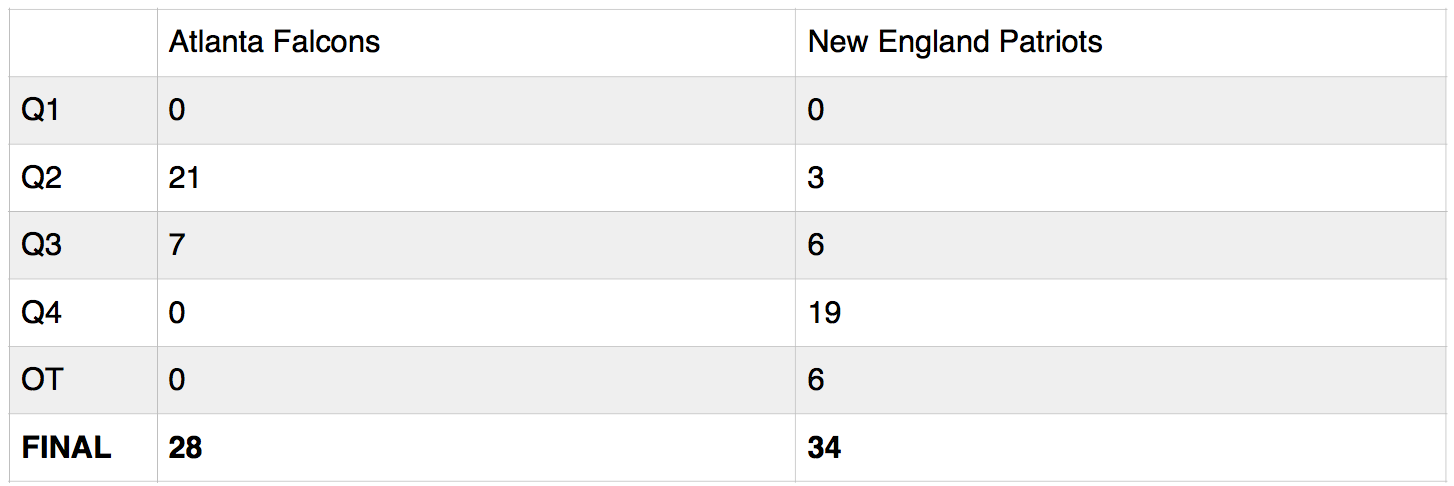Football. Food. Laughs. Disbelief. Utter Disbelief.
Maybe you partook in one of the above items a few weeks ago during the Super Bowl, and maybe you enjoyed it; or maybe you didn’t. Either way, it was a fantastic game, and a beautiful display of emotional resiliency. For those who didn’t watch the game, this is scorecard:

Ultimately, the New England Patriots - headed by Tom Brady (Quarterback) - led a comeback in the 2nd half to force overtime, eventually winning in that overtime. This blog post however isn’t meant to talk about football, it’s designed to highlight the specific nature of emotionally resilient people, and what we can learn from this specific game.
5 Traits of Emotionally Resilient People
#1 Have perspective:
During the game, Tom Brady and the Patriots needed to keep a positive perspective, likely battling internal thoughts about losing (feeling ashamed, embarrassed, etc.). However, they hadn’t lost, at least not yet, and they chose to see that. By keeping this perspective, the Patriots were able to overcome the doubt of a negative start.
The lesson: Positive perspective allows us to learn from our mistakes instead and move forward accordingly; positively.
#2 Depend on a team:
Many people have been quoted saying that football is the ultimate team sport, and in many ways it’s true. Guess what? Tom Brady didn’t win the Super Bowl by himself. He was surrounded by coaches, players, and family members that all - have and will - play a part in his success.
The lesson: Resilient individuals realize they don’t have to wonder alone, and they become intentional about surrounding themselves with the ‘right’ people.
#3 Be honest:
At halftime of the Super Bowl they was no celebrating in the Patriots locker room. They were down, mad, and embarrassed. They also were aware and willing to see the truth. Honesty and self awareness allows us to assess, critique, and progress.
The lesson: You can’t fool yourself, so don’t try. Accept the truth, assess it within appropriate perspective, and create a plan to move forward.
#4 Look for options:
Tom Brady passed, ran, handed it off, called timeout, and spiked the ball. Each of these moves was intentional, planned-ahead, and strategic. Like a surgeon working a scalpel, the Patriots functioned with precision in the 2nd half of the Super Bowl. Much of this was due to having options; options they had prepared for ahead of time.
The lesson: Preparation is important, and when done correctly, options will show themselves as available. This relates to your life, your sports, and your career.
#5 Fight with everything:
Is Tom Brady the best quarterback in NFL history? Maybe. Maybe not. One thing is certain however, he is one of the best fighters in all of sports, and probably careers. The passion, resiliency, and emotion that he produces every single day is unrivaled, and you can see it. Tom Brady want’s to be the best, and there isn’t much standing in the way of him chasing that.
The lesson: You have to be willing to fight with everything when you have lofty goals.
Resiliency isn’t just something you’re born with; it’s something that’s practiced, and learned. The Super Bowl win by Tom Brady and the New England Patriots is a great example of emotional resiliency in action.
My hope is that you use the above traits to influence your lives, families, and careers. Remember, you too can be resilient. You just have to work at it.

















![How to Lose Your Job [in 10 Days]](https://images.squarespace-cdn.com/content/v1/5970ed5729687fae2707b0b5/1506534701141-136XKC17RJRZNI6MQISX/image-asset.jpeg)




